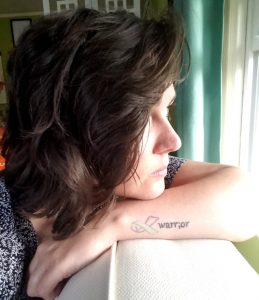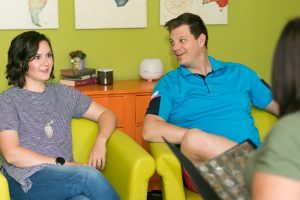Lock and Talk Virginia is a statewide suicide prevention initiative that focuses on limiting access to lethal means, such as guns and medications, that could be used for suicide. Suicide prevention coordinator Rebecca Textor talked with Whitney C. about her experience.
Whitney’s tattoo expresses her story: The ribbon means she’s a survivor of domestic violence and sexual assault. However, she’s not just a survivor—she is a warrior, battling against triggers and fighting to help others. The semi-colon means it’s not the end of her story.
R: What does it mean to you for you and your husband to be a lock and talk family?
W: For me it’s a matter of life and death. There are many ways people can die by suicide. The things you can lock up which could be used in a suicide, should be locked up.
The temptation of just seeing it there can make you a lot more likely to attempt suicide if you have those thoughts than if you didn’t have easy access to it. I think talking about suicide thoughts is so important so people around you help you through whatever you’re going through- If you’re able to lock up [means to suicide] and talk about problems, the chance of suicide within your home is going to decrease significantly.
R: Why is suicide prevention such an important conversation for you and your husband?
W: Talking with your spouse and letting them know what you’re feeling and what you’re going through is important. Regardless of whether you’re thinking about suicide or not, it’s when you stop talking and don’t tell them that you’re struggling–that’s when you may start having thoughts of suicide. Nobody’s there helping you and supporting you and you feel like you’re alone. If you’re single, it’s so important to find a confidant. Just somebody there to help you through stuff, because sometimes you just need a friend, a parent, or somebody you can really talk to. And that person has to be willing not to control you. There has to be some balance there. They need to be able to help share in your burden. My husband and I think it’s important to be able to talk about suicide because growing up, I had thoughts of suicide. I battled thoughts of suicide frequently, especially in my late teen years. I would see a bottle of pills and think, “I just want to take that whole thing and never wake up.” “I’m done, I’m so over this I hope this car just wrecks and I die.”
I’ve come a long way since I sought help. It was a mental health issue in a sense– when I was struggling emotionally. I’m at a much lower risk now that I got help. If I start having thoughts of suicide again or thoughts where I just want to run away, it’s because something is triggered from my past. I then know I have to work it out. Either I talk with my husband or call my therapist and say, “Hey, this is going on.” After talking with people, now I can identify when I am triggered, and I need to seek help or readjust so I don’t have those thoughts of suicide. I feel way more confident.
R: Thank you for sharing that because your words are going mean so much to a lot of people. Do you feel like talking to your husband about this strengthened your relationship?
W: Definitely! It wasn’t always easy, especially at first. It’s really hard because you feel you may be judged, you feel shameful and guilty. There are so many emotions that come with it. I look at it this way. I work with children. When they scream because they can’t get a toy out of a nook they got it stuck in, they are really screaming because they need help. You want to say, “It’s okay, you can use your words to ask for help.”
As adults we may feel “stuck” and want to scream, in turn throwing our life in to chaos around us. It’s those moments when we really need to learn to ask for help or to talk and process our emotions with someone.
My pastor was one of the first ones who really identified and saw my need for help. After my husband took me to his house because I was spiraling out of control my pastor said, “You need to meet with our counselor.” He knew the right person to help me.
At first I didn’t talk at all because I was healing from abuse. I talked with my therapist mostly when necessary like in our sessions. Some weeks that was the only time I’d talk to my husband too. Sometimes the healing process is like that. We need to be patient with people at that time. It’s all part of the healing process.
We can say, “I’m here if you want to talk” or “I want you to know I love you, I’m here for you, and I support you when you’re ready to talk.” This lets them know you are supporting them but gives them time to fully heal. But if it’s a high suicide risk, step in. A therapist can identify high risk times and can also help your partner identify when things are getting dangerous.
Therapists can really empower you to realize who you are and how you handle things. They can teach you to how to stand up and protect yourself. Ultimately, I owe my life to that pastor who convinced me to get help. I was in a downward spiral and making really bad decisions. I was about to try to go back into a very toxic relationship and throw my life into complete turmoil. If he had not stepped in, I don’t know where I would be today.
R: Is it getting easier to talk about it?
W: Absolutely. I still have to process things and I still internalize some of these feelings, but every time I’ve talked to my husband, it has helped. When we can’t figure out how to handle it, we call my therapist together.
Right now, we both know the code to our medication lock box. But we agree that if I ever got to be a danger to myself again, he can change the combination until things get better. The person who knows you best can help you before things escalate into a crisis.
R: It sounds to me like you have a great support network around you. Do you have advice that you want to give others who may be struggling right now?
W: If you are in an abusive relationship, reach out when it’s safe. Whether it’s a note saying, “I need help” to someone, get the message out. You can get away from your abuse and you can heal from it. If you are thinking about suicide, please reach out to someone.
R: Thank you so much, Whitney. I believe your courage will inspire someone who is hurting to get help. We are so grateful your family supports the Lock and Talk initiative.
Special thanks to: Whitney and Seth C.
Tasha Lamar of TashsaLamarPhotography on Facebook
lockandtalk.org.
First Step Women’s Shelter: (540) 434-0295
HRCSB Emergency Services 24/7: (540) 434-1766
Suicide Prevention Lifeline 24/7: 1-800-273-8255
Crisis Text Line: 741 741 and enter “Hello”
By Rebecca Textor
DBHDS Region 1 Suicide Prevention Coordinator



